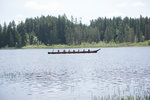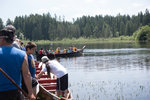

Groups of individuals, somewhere between 10 and 14 or so per group, consistently loaded into large sea-ready canoes Saturday afternoon, taking off from the dock at Deep Lake in Millersylvania State Park for a lap around the lake.
Each group was joined by a member of the Chehalis, Nisqually, Puyallup or Skokomish canoe families, and they told the others in the canoe the significance of the craft in northwestern native culture and the tribes’ connection to the Washington waterways.
“It’s our ancestral way of travelling our highways ... We don’t need the canoe to travel anymore in our waterways, but what we do is we get in our canoes because of the tradition that this brings us. This brings identity to our kids, who we are as indigenous native people,” said Hanford McCloud, canoe skipper and tribal council member with the Nisqually Indian Tribe.
During the event, which was filled with information on tribal culture, food and crafts, another large topic was the upcoming canoe journey to Lummi, set to take place in July and include some 10,000 people.
Yvonne Peterson, with the Chehalis Tribe, said canoe journeys are powerful experiences that distill the younger generation with knowledge that elders possess and hand down. Different tribes host each journey, which are open to native and non-native people alike, she said.
“It’s powerful, it’s memorable and it makes a young person to commit to learning their language,” she said, adding that certain ceremonies require them to speak in the native tongue.
The journey itself will take somewhere between eight and nine days, said McCloud. When they arrive, the event will involve traditional songs, dancing, testimony and celebration of culture.
There’s not a lot of information about canoe journeys out there, said McCloud, so Saturday’s event, the fifth of its kind, is meant to share some of that culture. Much of that is done during the canoe trips around the lake. He said he would take his crews for a lap around Deep Lake, talking along the way.
A line of people remained consistent through the day, waiting for their chance to take the free canoe ride, during which everyone took part in the paddling.
McCloud tells them about history, including his own, and about the canoe journey. Their reactions are usually ones of thankfulness, he said.
Saturday’s event, in addition to the information shared, served to raise money for the journey. Each of the four tribes contributed some resources toward its operation.
“One tribe could not do it by themselves,” said Peterson.
The park was full of people and activity Saturday, as booths were set up here and there selling crafts. Food was being sold out of a shelter, with salmon, Indian tacos and fry bread on the menu.
Makaela Kroin, folk and traditional arts program coordinator for Washington State Parks, was helping out with the food preparation, saying the day was busy enough that it had become an all-hands-on-deck situation.
Kroin said she worked with the tribes to coordinate the event in the park. Word about the day seems to spread more and more each year.
“It’s wonderful for them to get an opportunity to fundraise for the larger paddle journey which will be taking place in late July this year,” she said.